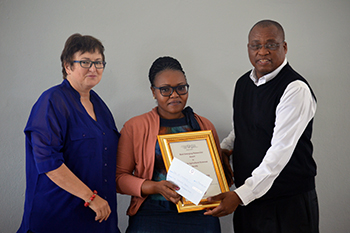Latest News Archive
Please select Category, Year, and then Month to display items
05 June 2018
Photo Supplied
 Archaeological excavations in the Wonderwerk Cave, north of Kuruman in the Northern Cape.
Archaeological excavations in the Wonderwerk Cave, north of Kuruman in the Northern Cape.
Research fellow Dr Lloyd Rossouw from the Department of Plant Sciences at the University of the Free State (UFS) recently published an article in the Nature Ecology and Evolution journal with Dr Michaela Ecker from the University of Toronto as lead author, and Dr James Brink, research fellow at the UFS Centre for Environmental Management. The findings described in “The palaeoecological context of the Oldowan-Acheulean in southern Africa” provides the first extensive paleoenvironmental sequence for the interior of southern Africa by applying a combination of methods for environmental reconstruction at Wonderwerk Cave, which have yielded multiple evidence of early human occupation dating back almost two million years ago.
Where water once was
The Wonderwerk Cave is found north of the Kuruman hills (situated in Northern Cape) a 140m long tube with a low ceiling. The surroundings are harsh. Semi-arid conditions allow for the survival of only hardy bushes, trees, and grasses. But during the Early Pleistocene, stepping out of the Wonderwerk Cave you would have been greeted by a completely different site, the researchers found. Using carbon and oxygen stable isotope analysis on the teeth of herbivores (Dr Ecker), fossil faunal abundance (Dr Brink), as well as the analysis of microscopic plant silica remains (phytoliths) excavated from fossil soils inside the cave (Dr Rossouw), the results show that ancient environments in the central interior of southern Africa were significantly wetter and housed a plant community unlike any other in the modern African savanna.
What difference does it make?
While East African research shows increasing aridity and the spread of summer-rainfall grasslands more than a million years ago, the results from this study indicate an interesting twist. During the same period, shifts in rainfall seasonality allowed for alternating summer and winter-rainfall grass occurrences coupled with prolonged wetlands, that remained major components of Early Pleistocene (more or less the period between one and two million years ago) environments in the central interior of southern Africa. That means our human ancestors were also living and evolving in environments other than the generally accepted open, arid grassland model.
UFS Qwaqwa Campus honours research champions
2016-11-22

Best Emerging Researcher in the Faculty of
Natural and Agricultural Sciences, Dr Puseletso Mofokeng,
being congratulated by Drs Elsa Crause
(Campus Vice-Principal: Academic and Research)
and Dipane Hlalele
(Acting Campus Vice-Principal: Operations).
The Centre for Teaching and Learning (CTL) and the Academic and Research Office on the Qwaqwa Campus of the University of the Free State recently honoured innovative academics and leading researchers. The event was the highlight of the 2016 academic year and was aimed at recognising academic innovation, dedication, and hard work.
The winning academics and categories were:
CTL Awards:
Dr Emile Bredenhand – Design Your Course
Dr Marga Stander and Bianca Naude (joint winners) – Student Engagement
Dr Marga Stander – Research in Teaching and Learning (runner-up: Fani Radebe)
Wouter de Wet – Assessment Methods (runner-up: Ntebohiseng Sekhele)
Ben Mase – Technology (runner-up: Dr Jared McDonald)
The History Department – Departmental Award
Outstanding researchers were also honoured per faculty on the day.
Academic and Research Awards:
The winners were:
Habasisa Molise – Best Emerging Researcher (Faculty of Education)
Calvin Mudzingiri – Best Emerging Researcher (Faculty of Economic and Management Sciences)
Dr Oliver Nyambi – Best Emerging Researcher (Faculty of the Humanities)
Dr Puseletso Mofokeng – Best Emerging Researcher (Faculty of Natural and Agricultural Sciences)
Dr Dipane Hlalele – Prolific Researcher (Faculty of Education)
Dr Jared McDonald – Prolific Researcher (Faculty of the Humanities)
Dr Tom Ashafa – Prolific Researcher (Faculty of Natural and Agricultural Sciences)
Prof Birhanu Dejene – Consistent Researcher
Prof Rodney Moffett – Life-long Researcher
The event also acknowledged Drs Geofrey Mukwada (Geography) and Aliza Le Roux (Zoology and Entomology) as newly-appointed Professors. The duo leads the Afromontane Research Unit.